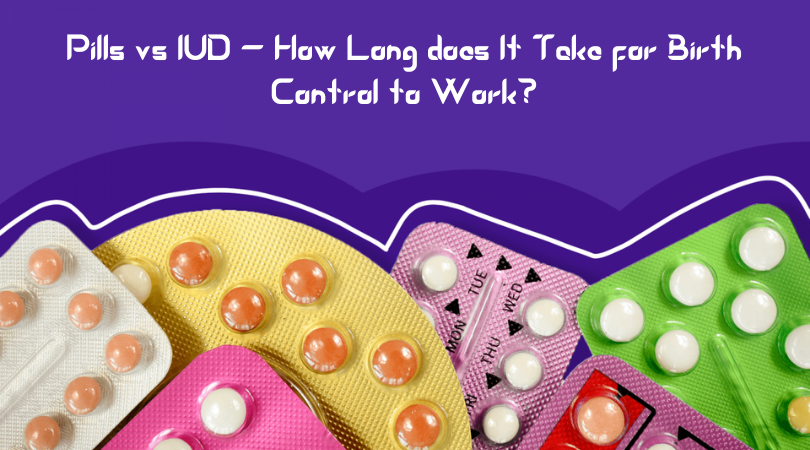Nowadays, there are so many different ways to protect from unwanted pregnancies. We will compare how fast and how effective birth control pills and intrauterine devices are. We will understand what birth control options start working faster.
When does birth control start working?
You need to take such drugs throughout the menstrual cycle at the same time every day. If you did everything right and did not miss taking oral contraceptives, the risk of an unwanted pregnancy is reduced almost by 100%. In order not to be mistaken, use the advice of professional doctors:
- take the first birth control pill on the first day of menstruation;
- if sexual intercourse occurs during menstruation, you must additionally protect yourself;
- in the first week of taking oral contraceptives, the body gets used to the drug, so it may not work properly.
If you take, for example, Levlen (Ethinyl estradiol/Levonorgestrel), well-known birth control drug, the first day of menstruation, you will get an immediate effect. If you take it later, you have to use additional contraceptive means to avoid pregnancy. There are many ways to buy Levlen birth control but Trusted Tablets offers one of the most available rates. This company offers high-quality generic analog delivered by online pharmacy internationally.
Some words about Levlen birth control pills. This product is produced to help women regulate their menstrual cycle, ovulation. The main function of this generic birth control is to prevent unwanted pregnancy. Before taking this COC, better to consult a gynecologist. The doctor will explain what dosage of generic Levlen you should buy and take. Levlen contains two female hormones: estrogen and progestin. The main components, as mentioned above, are Ethinyl Estradiol/Levonorgestrel. The dosage is 0.03/0.15mg.
How quickly does an intrauterine device start working?
An intrauterine device can be set on any day of the menstrual cycle. Be sure to exclude pregnancy, but it is recommended to do this on the 4-8th day from the menstruation onset. An intrauterine device can be administered immediately after:
- artificial termination of pregnancy;
- 2-3 months after labor;
- not earlier than 5-6 months after the cesarean section.
Within 7-10 days after the introduction of an intrauterine device, it is recommended to:
- limit physical activity;
- not to take hot baths;
- not to take laxatives and uterotonics;
- to exclude sexual activity.
A woman should be informed about the timing of the intrauterine device use, as well as about the symptoms of possible complications requiring urgent medical attention. A second visit is recommended within 7-10 days, then in normal condition – within 3 months.
When should an intrauterine device be removed?
The device can be removed at any time at the request of a woman. It is imperative to remove the IUD after the end of the recommended period. If a woman wishes to continue using intrauterine contraception and there are no medical contraindications, the “new” device can be set immediately after removing the “old” one.
What’s better?
When choosing a birth control method, it is important for a woman to know which of them is the safest, most effective, economical. Only a gynecologist can find out which is better, the IUD or birth control pills like Levlen, Alesse, and etc have their own pros/cons for each particular case. The doctor selects the method of protection individually. Take into account when choosing a method of contraception:
- overall health state;
- the presence of contraindications;
- age;
- the presence/absence of pregnancy in the anamnesis.
Keep in mind that an IUD is rarely set on nulliparous women. Doctors dissuade patients from such an undertaking, arguing the possibility of infertility as a result of uterus deformation.
Therefore, the choice for women who have not yet experienced the happiness of motherhood is obvious – oral contraceptives. They should not be taken without consulting a gynecologist first. The doctor will select the best option for birth control pills, taking into account the characteristics of the female body.
Carry out a consultation with a doctor both when changing pills and when refusing them.
The IUD is often chosen for ease of use. This method is especially relevant for active women who may simply forget to take pills. If a couple has a child and they want to conceive the next one no earlier than 3 years later, then the IUD is the best option for protection.
The IUD helps when it is impossible to pick up birth control pills: for example, the body reacts to hormonal drugs with persistent side effects.
It is undesirable to take OK if you are predisposed to gastrointestinal diseases. During the adaptation period, they can provoke pain in the stomach, induce vomiting. This is fraught with the start of intestinal diseases or their exacerbation.
When choosing other birth control options?
Oral contraceptives and intrauterine devices are relevant only with regular sexual activity. If sex occurs with the same partner, then these options are able to solve the main problem – to protect from pregnancy.
If you have multiple sexual partners, there’s another issue that needs to be soled: protecting against sexually transmitted infections. The best solution, in this case, is barrier protection options (diaphragms, condoms).
If sexual intercourse occurs regularly, but with different partners, a woman may choose to protect herself from pregnancy with the help of COCs or an IUD, but insist on using a condom at each contact.
If a woman has severe health problems and a possible pregnancy poses risks to her life, then irreversible methods of contraception are recommended – sterilization.




